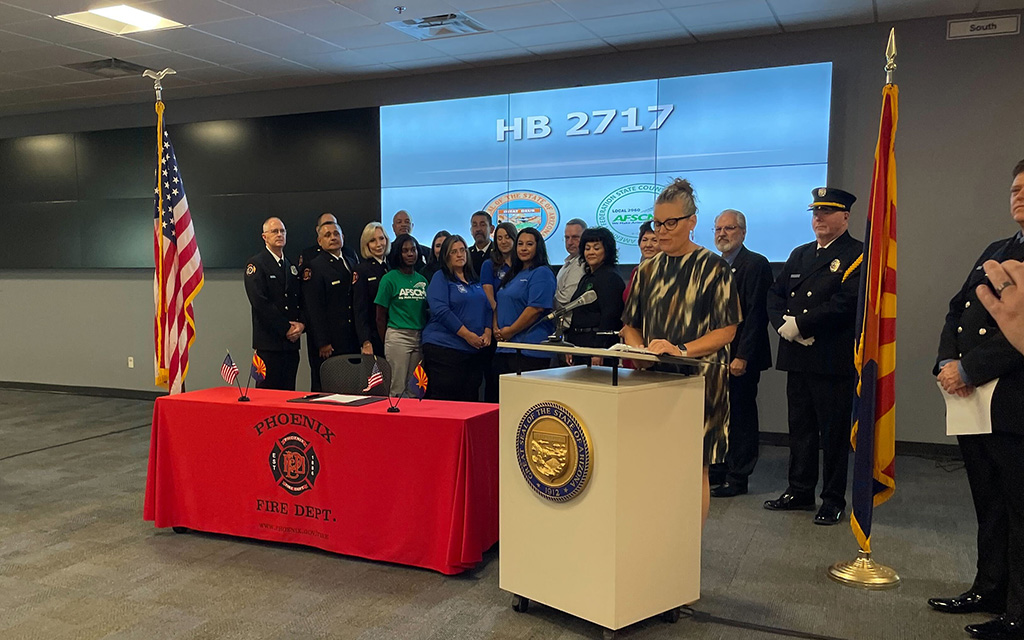
Arizona Gov. Katie Hobbs celebrates a bill offering trauma therapy to 911 dispatchers on Aug.23, 2023, at the Phoenix Fire Department’s 911 regional dispatch center. (Photo by Cameron Arcand/Cronkite News)
PHOENIX – Arizona’s 911 dispatchers now have access to trauma therapy paid for by their employers, under a new law that comes as the state grapples with a shortage of dispatchers.
Gov. Katie Hobbs held a celebration for HB 2717 last Wednesday at the Phoenix Fire Department’s 911 regional dispatch center with state Rep. Melody Hernandez, D-Tempe, who introduced the bill, along with first responders.
“Many of these calls can mean the difference between life and death for the caller, and those on the receiving end are tasked with putting their emotions aside and acting decisively to get help where it’s needed,” Hobbs said. “To say the least, our 911 dispatchers have the grave responsibility of keeping our neighbors and communities safe.”
The new benefit for dispatchers comes amid a shortage of them – both in Phoenix and statewide – and it is being viewed as a potential recruitment tactic and retention tool for dispatchers who often hear traumatic incidents over the phone. Traumatic incidents that are covered in the bill include “visually or audibly” witnessing the death of a person.
The bill, which expands a benefit that was already available to police officers and firefighters, was signed by Hobbs on May 1. Twelve visits are covered, but an employer will be required to pay for up to 24 additional sessions if a licensed mental health professional deems it necessary.
“Ensuring dispatchers get the care they need will help us fill gaps in our workforce. With recent reports of dispatcher shortages across the state, it was clear that we needed to take action,” the governor said. “In order to entice people to take these jobs, we must give them the tools they need to thrive outside of the workplace as well. Especially in this field, that includes the necessary health care services that promote the emotional and mental well-being of our dispatchers.”
For the Phoenix Police Department alone, there were 64 job openings for dispatchers as of July 7.
“You know, I don’t want to speculate on why people choose what professions that they do. I can absolutely tell you that whenever you’re getting into a career in law enforcement, whether that’s as an officer, as a 911 operator, it’s a lifestyle change as well,” Sgt. Brian Bower of the Phoenix Police Department said in an interview. “It takes a lot out of a person, so it does take a unique person to apply for that kind of position and to stick with it.”
“We also have an issue on keeping those employees employed in that position because it’s such a grueling task and such a grueling career for some of these employees. So retention is also a big concern,” Bower continued, adding that additional training and pay have been methods they’ve used to keep and recruit workers.
Bower said in an email that the city is also encouraging different methods of reporting to authorities, such as an online reporting system, which is meant for non-emergency situations.
Hernandez said the legislation brought lawmakers and stakeholders together, as almost all Democrats and Republicans voted in support of the bill.
“This was a bipartisan, powerful effort with labor, with every possible entity that you can imagine. And as interesting as the stories about the legislature can get, there are very beautiful moments like this,” she said.